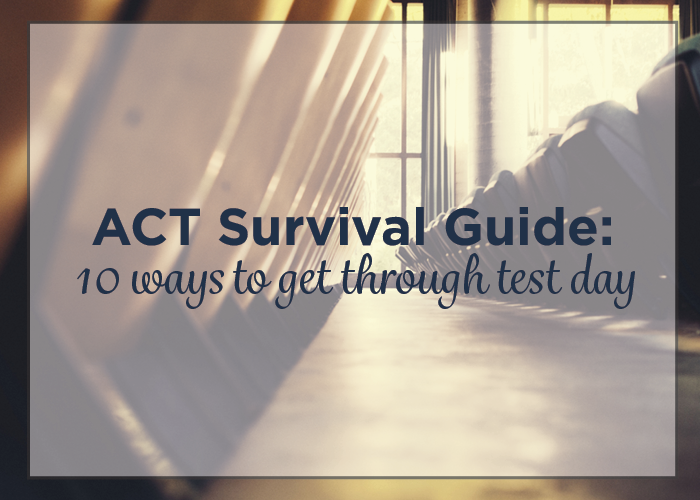If your ACT exam date is fast approaching, you—like a lot of students—might be getting nervous. Sure, you’ve put in the work, the time, the practice tests. But how can you be sure that it will all pay off on test day?

First of all, you’re in good company! A lot of students have test anxiety, and this usually worsens as the test date approaches. Second of all, know that there are strategies you can use to make the test-taking experience easier on yourself. With that in mind, here are 10 ways to get through test day.
1. Know Your Goals
You wouldn’t go into the woods without a map (I hope!)—so why go into a high-stakes test without a plan? What is a good ACT score to aim for? By the week before your test date, you should have a good sense of both how you’re currently scoring on your practice exams (or how you did on your last official test, if this is a retake), and the scores you’ll need to get into your dream college. If there’s a big difference between those scores, plan on taking another official ACT exam before college apps are due.
2. Have a Plan
With your goals in mind, consider what you’ll need to do in order to achieve them. Is there one particular section you’ll need to ace? Look over your most recent exams and figure out what order you’ll answer questions in on that section, and consider brushing up by reviewing materials in those areas if you still have a few days before the official test.
On a purely practical note, plan your travels, as well. Map out what your day will look like well in advance. How long will it take you to get to the testing site? Add half an hour to that. Yes, you may end up waiting to get in—but that’s a lot better than being late and missing the test altogether!
3. Prepare Well
Don’t leave any aspect of your test day to chance—even before you get to the testing center! In addition to having your route planned in advance, make sure you gather everything you need, including ID, your ticket, a sweater or sweatshirt, pencils, calculator, and a snack, the evening before. Plan on doing some quick exercise the morning of the exam to get the blood flowing and keep your mind sharp. And above all, make sure you get enough sleep! This is NOT the time to pull an all-nighter.
4. Protein!
Repeat after me: yes to protein, no to sugar. Eating a sugary breakfast will cause your blood sugar to spike and then fall, leaving you with less energy than before—and probably hungry and cranky, too. You also have the opportunity to take a snack with you for the break in the test. Do it! But again, make sure it’s protein-, rather than sugar-, loaded. The protein will give you energy, but release it at a steadier pace, avoiding the kinds of swings associated with sugar.
5. Tip Sheet
The week before the official exam, start getting your “cheat sheet” together. No, I’m not talking about actually cheating—I’m talking about a piece of paper that has formulas you often forget, strategies you’ve been using, reminders about timing, and any other information that might come in handy at the last minute. Take this with you to the test site (though do not use it during the test)! You’ll be able to look it over before you go into the exam, if you’ve arrived in plenty of time. This will not only reassure you—after all, you’ve done a lot of work!—but also store info in your short-term memory that your long-term memory’s already forgotten.
6. Breathing Exercises
Breathing exercises are especially important if you experience test anxiety. You can do them before the exam, or even during (if you’re mindful of your neighbors and do them silently). When you feel panic coming on, close your eyes and inhale through your nose slowly to a count of four. Then, exhale through your mouth to the count of four. Next, inhale to the count of three, and so forth. Yes, it takes a few second, but the panic-calming benefits are more than worth it.
7. Forget the Scores
As we’ve already seen, you should be approaching the test with a goal ACT score range in mind. Approaching it that way, not taking it! Don’t try to calculate your scores as you go through the exam. Focus on the questions in front of you. If there’s time left at the end of the section, go check your work (you’ll usually catch something—really). Trying to assess how you’re doing in the middle of the exam will not only throw you off your game, but it’ll also take precious mental space away from the questions at hand and, ironically, lower your score.
8. Check Your Work
You won’t always have time to do this, but you know your testing habits by now: if you have a minute or two at the end of a section and you often make avoidable errors (dropping a negative sign is one example), make sure to leave time to go back and check your work.
9. Hack the Exam
Well, lifehack it, anyway. Seinfeld, tomatoes, music, and gum can all help you succeed on the test—when used correctly. Take a look at some of the best exam lifehacks in this infographic!
10. Reward Yourself!
When the test is over, make sure you have a reward in mind. It doesn’t have to be something you’ll buy; it could be as simple as spending time with friends, going for a walk with your dog, or anything else you enjoy doing that you’ve had to put off due to studying. This will help motivate you during the test, as well as giving you a much-needed relaxation break after what can be a stressful experience.
And no matter what your experience was like, congratulations! You’ve now conquered one of the biggest steps in the college admissions process. Even if you’re not happy with your score, you’ve taken a huge leap forward. So go on, take that reward—you deserve it.
















 Back
Back